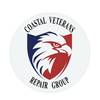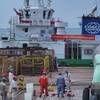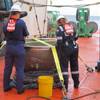As part of the IMO's continuing work to update and amend the regulatory framework surrounding international shipping, the following amendments to SOLAS and MARPOL will enter into force on 1 January 2002:
May 2000 amendments to the International Convention for the Safety of Life at Sea (SOLAS), 1974 SOLAS Chapter III, regulation 28.2 for helicopter landing areas is amended to require a helicopter landing area only for ro-ro passenger ships.
The requirement for a helicopter landing area was originally meant for all passenger ships of 130 metres in length and upwards constructed on or after 1 July 1999, but in May 2000 IMO's Maritime Safety Committee (MSC) decided to amend the regulation to make this requirement applicable to ro-ro passenger ships only (constructed on or after 1 July 1999).
Regulation 28.1 of SOLAS chapter III requires all ro-ro passenger ships to be fitted with a helicopter pick-up area.
May 2000 amendments to the 1988 SOLAS Protocol
The amendments add the words "bulk carrier" under the heading "type of ship" in the form of the Cargo Ship Safety Construction Certificate, Cargo Ship Safety Equipment Certificate and Cargo Ship Safety Certificate given in the appendix to the Annex to the Protocol of 1988 relating to SOLAS.
This means that the options for type of ships for these certificates are now given as: Bulk carrier, Oil tanker, Chemical tanker, Gas carrier, and Cargo ship other than any of the above.
April 2000 amendments to the International Convention for the Prevention of Pollution from Ships, 1973, as modified by the Protocol of 1978 relating thereto (MARPOL 73/78)
The amendment to Annex III (Prevention of Pollution by Harmful Substances Carried by Sea in Packaged Form) deletes tainting as a criterion for marine pollutants from the Guidelines for the identification of harmful substances in packaged form.
Tainting refers to the ability of a product to be taken up by an organism and thereby affect the taste or smell of seafood making it unpalatable. A substance is defined as tainting when it has been found to taint seafood. The amendment means that products identified as being marine pollutants solely on the basis of their tainting properties will no longer be classified as marine pollutants.











